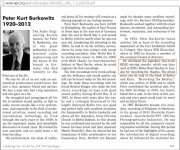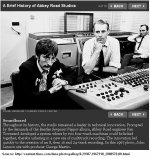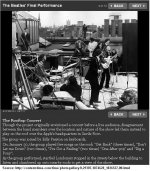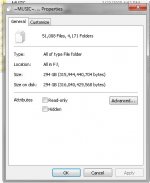I believe he means the latest error correction technique for extracting the correct data off the disc. That is an area that has improved over time and is not a fixed specified technique.
I have used (because I have it) the tool in Wavelab for several years, it is a style of EAC built by that platform. It does successive re-reads til it get the data from the disc correctly, ie no errors. The acceptable error level can be specified. In the early days I think it only worked well with Plextor drives, today, probably all.
Alan
I have used (because I have it) the tool in Wavelab for several years, it is a style of EAC built by that platform. It does successive re-reads til it get the data from the disc correctly, ie no errors. The acceptable error level can be specified. In the early days I think it only worked well with Plextor drives, today, probably all.
Alan
And bit perfect digital being a myth is pure rubbish.
As has been said, C2 errors are exceedingly rare except on badly damaged discs. CD has one of the more robust error correction systems around.
Back in the day, I had an early Yamaha CD players whose chipset had error flag pins so that the various errors could be monitored. I actually made a little digital counter that could be tied to those pins and count the number of times errors occurred. Never encountered a C2 error with any of this discs I had. And this was with a relatively cheap player.
This is just another neurotic audiophile Bogey Man and is just another huge waste of people's time.
se
As has been said, C2 errors are exceedingly rare except on badly damaged discs. CD has one of the more robust error correction systems around.
Back in the day, I had an early Yamaha CD players whose chipset had error flag pins so that the various errors could be monitored. I actually made a little digital counter that could be tied to those pins and count the number of times errors occurred. Never encountered a C2 error with any of this discs I had. And this was with a relatively cheap player.
This is just another neurotic audiophile Bogey Man and is just another huge waste of people's time.
se
Seeing that the relevant error correction is the same in any and all CDP's that is a nice thing to know. Now to say that there are various implementations it would seem that could cause some differences in effectiveness but I assume with what is being said that the final result meeting the Red Book standard would require that the end results are equivalent. So I will again assume then that the differences between cd players is in the dsp and any analog conversion. I have three very different sounding players, an older Sony ES unit, a Denon and I think a Technics unit. I think if I remember correctly that the Sony may be a 1-bit type of player and I don't know about the others. The Sony is most definitely to me the best sounding though I have heard many say that this 1-bit technology was not the best way to do things. What is considered then the sota in conversion today, all I know of is 1-bit and Delta-Sigma, is there something else? Never studied any of this so I am just asking from a position of unknowing.
So what is considered the state-of-the-art in error correction today for a cdp? Has there been any real progress or basic changes in the current CD players or have things gone stagnant since the progressively lower sales of CD's or have we made progress? Do we just jump to SSD storage of music and keep the entire chain that we control away from mechanical reproduction through any type of spinning disk?
yes. SSD. The further away from LP and CD mechanicals, the better (IMO). I've already changed over to SSD on my desk-top and portables.
THx-RNMarsh
Now you guys are up to the 5532 and the TL0-72. You only have about 35 years to go! '-)
I don't know...5532 is weird, good driver but I don't know what it is with BJT just sounds like more Non-linear characteristic's...maybe it's just me.
I doubt people of EMI lied about their own history.
About Abbey Road record, after a phone call to somebody who knows the history from inside, you are right, they had access to the 8 track machine and recorded this Album on it, like was done the previous "Beatles" Album.
Let-it be, i apologize for the confusion.
Re Beatles:
Landmark Productions: The Beatles - The White Album - MusicTech | MusicTech
http://schematic.danrudin.com/index.php?dir=REDD/
And a few screenshots
George
Attachments
Last edited:
yes. SSD. The further away from LP and CD mechanicals, the better (IMO). I've already changed over to SSD on my desk-top and portables.
THx-RNMarsh
Maybe we now start to worry about EC in SSD read/write processes. SSD read/write is just as imperfect as CD read/write. Error correction to the rescue!
You can't get away from it THAT easy ;-)
Jan
This and interpolation is what i was thinking..... I'll have to buy a newer CD player to get latest error correction technique;
My check of interpolated errors used a Magnavox/Philips player of late '80s vintage- the chipset had a flag on one pin. It was already a solved problem then. The corrected errors were never a problem from the beginning, it's pure math built into the process (as Steve mentions, CIRC).
This is a total non-issue, even more so because downloads and streaming are rapidly obsoleting physical media for distribution.
yes. SSD. The further away from LP and CD mechanicals, the better (IMO). I've already changed over to SSD on my desk-top and portables.
THx-RNMarsh
Have you heard that bit-identical tracks sound better if ripped on a computer with a linear power supply as opposed to a switching supply. True. A guy over on CA has blind test evidence.
A guy over on CA has blind test evidence.
Cite?
Maybe we now start to worry about EC in SSD read/write processes. SSD read/write is just as imperfect as CD read/write. Error correction to the rescue!
You can't get away from it THAT easy ;-)
Jan
I do not believe it is as bad as a CD.
With nano sec response times - who would care? Wouldnt have to fake it just correct it to original.
-RNM
Do we just jump to SSD storage of music and keep the entire chain that we control away from mechanical reproduction through any type of spinning disk?
Yes and NO ....
If you count motherboard RAM as the SSD and various hard drives as the spinning disk.
Ye olde 20'th century people !!
by my first CDEX ripper and MP3 codecs in 1999. That was even before I
knew of C1/2 ??
It was cool to be able to chose the "fate" of the C2's (skip/normalize) or even
how many C2's to trigger this.
The ripper would show the quality of the source before the conversion.
Now , I use the 21'st century "ripper" , which even allows the fate of C1's to be controlled.
C2's can be heard (with enough of them) " honey, screw this CD" type of thing.
Now I'm down to 10 blu rays , 110 DVD's , and my now "bit -perfect"(below)
51K music collection. Plus , the 3X redundancy I never had with CD's.
Dang , next .... put a terrabyte SSD in my DAC (to remote control them
50K songs) and circumvent even the PC !
OS
Attachments
I think Jan hint at the fact that SSD uses NAND flash which also produces errors that is corrected by error correction. So in reality similar to CD apart from the fact in a SSD hard errors are not acceptable.
Actually we use error correction every day in our cell phone and other communication systems. Works just fine.
Mogens
Actually we use error correction every day in our cell phone and other communication systems. Works just fine.
Mogens
I do not believe it is as bad as a CD.
With nano sec response times - who would care? Wouldnt have to fake it just correct it to original.
-RNM
SSD has errors , magnetic HDD's have errors / bad sectors - unrecoverable
sectors. Firmware will quickly shift the data to another sector , mark the bad to
unrecoverable and never write to that one again.
Most 2-5 YO HDD's have 1-2 of these re allocated sectors. Firmware
will read a sector many times to determine if it might go bad in the future
and will nead to be "zapped".
It's all "bit perfect" , a windows DLL 1 byte off will make a "blue screen"
and crash the operating system otherwise !!
OS
I think Jan hint at the fact that SSD uses NAND flash which also produces errors that is corrected by error correction. So in reality similar to CD apart from the fact in a SSD hard errors are not acceptable.
Actually we use error correction every day in our cell phone and other communication systems. Works just fine.
Mogens
SSD's do the same thing as Hdd's. Nand can only be written to X times ,
then a sector is bad and marked.
Since a SSD sector can not be written to as many times as a mechanical one ,
the SSD firmware will randomize the writes so no one sector gets "assaulted"
too often.
SSD firmware is almost a mini operating system.
But ... at the buffer RAM output , only perfect data emerges (or you get
a perfect blue screen).
OS
SSD is way better, not like mechanical drive where arm can wear out/Platter damage/bad sector's etc...and HDD is slow as hell.still old school Raid 0 setup Short-stroking over here xD, Damn old Hitachi deathstar's did finally turn into the deathstar xD I got some WD Blue's now, man they Rock haha. Don't get/go Seagate enough said haha
Dammit I want one of the M.2 SSD's one of the lightning fast ones etc haha
Need all kind of stuff, really want to hit 5ghz Stable with the 8320 this chip, will do it too, with current cooling no..average aftermarket air unit, need water/good loop or higher end air...4.7-4.8ghz tops, just no way can handle that ridiculous Vcore jump needed.
4.7-4.8ghz 1.48vcore 5 case fans still yeah can hit 50-55c easy and its warming up here/higher ambient's this isn't good xD
Break out old R2Gene and try to kill the 920 etc kinda want too haha, I smoked a Xeon w3520 throwing some voltage at it 4.2-4.4ghz threw like like 1.45-1.5v at it, went really high with PLL too though haha..way too much it died after a bit of Cinbenching/prime and Battlefield real quick haha, man it ran good though haha
Dammit I want one of the M.2 SSD's one of the lightning fast ones etc haha
Need all kind of stuff, really want to hit 5ghz Stable with the 8320 this chip, will do it too, with current cooling no..average aftermarket air unit, need water/good loop or higher end air...4.7-4.8ghz tops, just no way can handle that ridiculous Vcore jump needed.
4.7-4.8ghz 1.48vcore 5 case fans still yeah can hit 50-55c easy and its warming up here/higher ambient's this isn't good xD
Break out old R2Gene and try to kill the 920 etc kinda want too haha, I smoked a Xeon w3520 throwing some voltage at it 4.2-4.4ghz threw like like 1.45-1.5v at it, went really high with PLL too though haha..way too much it died after a bit of Cinbenching/prime and Battlefield real quick haha, man it ran good though haha
Last edited:
SSD is way better, not like mechanical drive where arm can wear out/Platter damage/bad sector's etc...and HDD is slow as ****..still old school Raid 0 setup HDD Short-stroking and **** over here xD
BS - tell me this in 7 years.
The "Olde" Hitachi ~music~ HDD has 2400 DAYS (olde Hitachi ... before IBM "deathstar's)
of operation with NO re-allocated sectors.
It was thrown into a dumpster from a second story window 5 years ago.
My first SSD (sandisk) had thousands of bad sectors and died in a year.
My samsung SSD has a couple already and still works ... but this
is normal for it.
SSD's will be perfected in a few years .... maybe with some quantum
"help" ???
OS
Last edited:
Wouldnt have to fake it just correct it to original.
-RNM
But that's what we have been talking about all this time, no? Error correction.
Do we have a language issue here?
Jan
OS,
Your experience is the reason I have yet to buy a SSD until the next generation which if I remember correctly will get away from the nand flash memory. For the price I'll wait until some of the newer technology hits the streets.
Audio Freak,
Why you would get a WD Blue when for little difference you could have one of the WD Black drives is beyond me? I've got two 10,000 rpm drives in my laptop about 5 years old now with no problems, It seems my old favorite Seagate drives have become POS's these days with terrible reliability. I have switched to WD as they just seem to be holding up better. SCCI drives are still the better choice since the quality is just better with at least having a 5 year warranty and expected to be used by enterprises.
Your experience is the reason I have yet to buy a SSD until the next generation which if I remember correctly will get away from the nand flash memory. For the price I'll wait until some of the newer technology hits the streets.
Audio Freak,
Why you would get a WD Blue when for little difference you could have one of the WD Black drives is beyond me? I've got two 10,000 rpm drives in my laptop about 5 years old now with no problems, It seems my old favorite Seagate drives have become POS's these days with terrible reliability. I have switched to WD as they just seem to be holding up better. SCCI drives are still the better choice since the quality is just better with at least having a 5 year warranty and expected to be used by enterprises.
Come on guys !!
There is NO errors allowed in PC digital.
The read / write errors are "pre- diagnosed" and compensated for.
My 1999 files are the same exact files I have now after being
written/ read/ burned from CD's , DVD's , and a dozen HDD's over
16 years. Not one byte off !!
PS - an audio CD is just optical vinyl .....
OS
There is NO errors allowed in PC digital.
The read / write errors are "pre- diagnosed" and compensated for.
My 1999 files are the same exact files I have now after being
written/ read/ burned from CD's , DVD's , and a dozen HDD's over
16 years. Not one byte off !!
PS - an audio CD is just optical vinyl .....
OS
- Status
- Not open for further replies.
- Home
- Member Areas
- The Lounge
- John Curl's Blowtorch preamplifier part II





